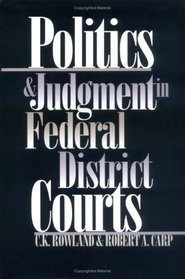Search -
Politics and Judgment in Federal District Courts
Politics and Judgment in Federal District Courts
Author:
Are appointment politics and court decisions linked? Do presidents use judicial appointments to shape their policy agendas? C. K. Rowland and Robert Carp provide definitive answers to these questions and, in the process, provide a new paradigm for the study of federal jurisprudence. As the authors remind us, since the Judiciary Act of 1789, fed... more »
Author:
Are appointment politics and court decisions linked? Do presidents use judicial appointments to shape their policy agendas? C. K. Rowland and Robert Carp provide definitive answers to these questions and, in the process, provide a new paradigm for the study of federal jurisprudence. As the authors remind us, since the Judiciary Act of 1789, fed... more »
ISBN-13: 9780700607761
ISBN-10: 0700607765
Publication Date: 7/1996
Pages: 240
Rating: ?
ISBN-10: 0700607765
Publication Date: 7/1996
Pages: 240
Rating: ?
0 stars, based on 0 rating
Publisher: University Press of Kansas
Book Type: Hardcover
Members Wishing: 0
Reviews: Amazon | Write a Review
Book Type: Hardcover
Members Wishing: 0
Reviews: Amazon | Write a Review
Genres:
- Politics & Social Sciences >> Government >> Legal System
- Nonfiction >> Philosophy >> General
- Law >> Rules & Procedures >> Courts
- Law >> Administrative Law >> Federal Jurisdiction
- Engineering & Transportation >> Law >> Administrative Law >> Federal Jurisdiction
- Engineering & Transportation >> Law >> Procedures & Litigation >> Courts




